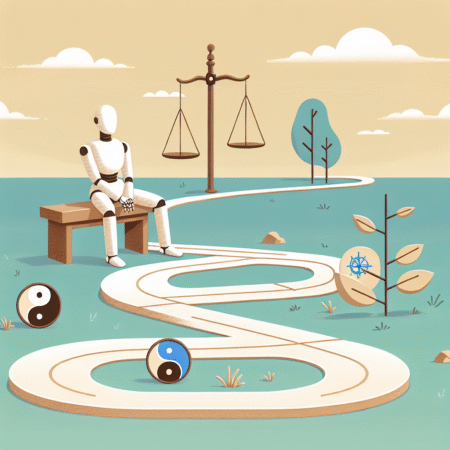The Growing Influence of AI
Artificial Intelligence (AI) surrounds us. From recommendation algorithms on Netflix to chatbots answering customer queries, AI seamlessly integrates into our daily lives. However, as technology evolves, it’s crucial to ask: what does this mean for us? Imagine a future where AI decides your healthcare treatment. What if these systems make choices that affect your life, like hiring decisions or criminal justice outcomes? This article explores the pressing need to incorporate ethics in AI.
AI can yield amazing benefits but raises complex ethical dilemmas. These challenges dictate how AI interacts with society and individuals. By understanding these implications, we can create AI that respects human dignity and promotes well-being.
The Ethical Quandaries of Machine Learning
Machine learning—the core of today’s AI—relies on data. It learns from historical information to make predictions or decisions. However, this learning comes with risks. AI systems can exhibit bias, reflecting systemic prejudices present in their training data. For instance, studies reveal that facial recognition technology misidentifies people of color more often than white individuals. Such biases can lead to real-world consequences, from unfair hiring practices to wrongful criminal convictions.
What happens when an AI makes a decision that harms someone? Who takes responsibility: the developers who built the system, the users deploying it, or the AI itself? This question cuts to the heart of accountability in AI ethics. No clear answer exists. The absence of guidelines leaves society vulnerable.
Experts suggest we must think carefully about the integration of human judgment into AI systems, especially in high-stakes areas like healthcare. How do we find the right balance between efficiency and human oversight?
One possibility lies in collaborative ethics—bringing together technologists, ethicists, and policymakers to create a framework that emphasizes fairness, transparency, and trust.
Real-World Examples and Their Lessons
Consider the case of an AI-powered hiring tool. Designed to streamline recruitment, the system ended up rejecting qualified candidates due to biases embedded in its training data. This real-life scenario illustrates the dangers of unchecked machine learning algorithms. It emphasizes the importance of auditing AI systems and adapting them to be more equitable.
Similarly, in law enforcement, predictive policing software has faced criticism for perpetuating racist profiling. These examples highlight that ethical lapses in AI can have dire consequences.
As we envision a future where AI systems consider moral dimensions, imagine this technology not only performing tasks but enhancing human life. Ethical AI can lead to better healthcare outcomes, fairer job recruitment, and safer communities.
People today must advocate for ethical AI practices. How can you, as the next generation, participate in this dialogue? Your understanding shapes the future of technology, paving the way for a society where AI respects and uplifts human dignity.
We stand at a unique crossroads. As AI becomes more pervasive, engaging with its ethical implications grows crucial. By examining responsibility, fairness, and the role of human judgment, we can navigate an uncertain but promising future. Your voice matters in crafting ethical solutions for tomorrow.
Expand Your Tech Knowledge
Explore the future of technology with our detailed insights on Artificial Intelligence.
Explore past and present digital transformations on the Internet Archive.
OPED_V1

